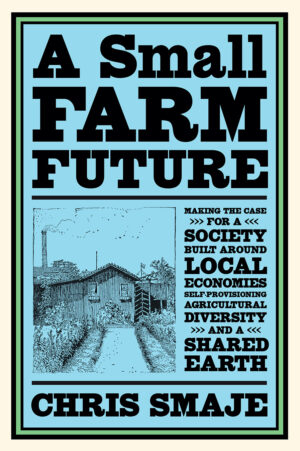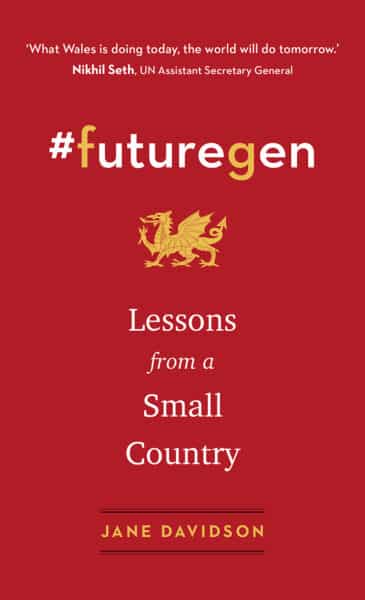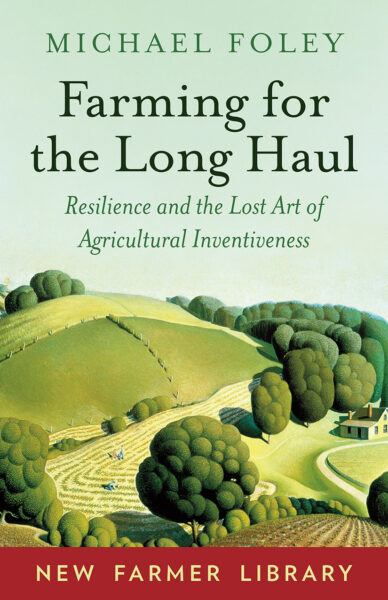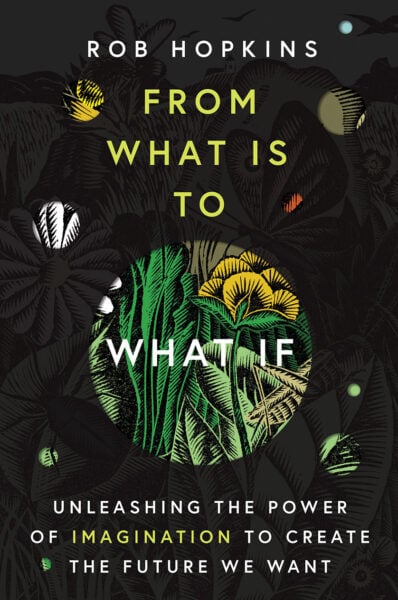The Energy Consumption Crisis
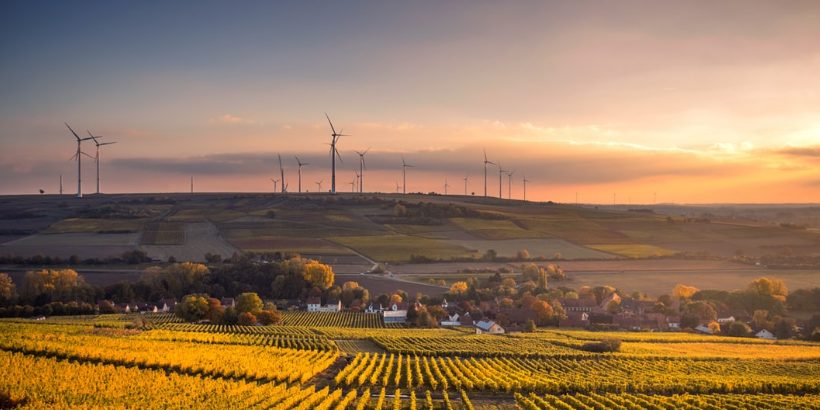
At the rate humanity is currently burning fossil fuels, we will create an uninhabitable earth long before we run out. So if the pressure of a finite resource doesn’t push us towards a renewable energy revolution, what will? And what will this revolution look like?
This is an excerpt from A Small Farm Future by Chris Smaje and has been adapted for the web.
The Energy Consumption Crisis
It’s a scientific axiom that energy can’t be created or destroyed. It can only change its form. Without going into technicalities, the way this works in everyday human situations is that flows of incoming solar energy are fixed in intermediate stocks that then do useful work for us – a full battery, a sack of coal, a cord of firewood, a bag of wheat.
When the work is done, the intermediate stocks are degraded and no longer available, their energy transformed mostly into low-grade heat that we can’t recapture. Sometimes, the degraded product has another use – ash from burnt wood can be used in soapmaking, human excrement from wheat can be composted to stimulate new plant growth – but the degraded product can’t do as much generalised work as the pristine one.
Unless we obtain fresh energy inputs and start the process again, the system reaches an equilibrium with its surroundings in which no more useful work can be done. With technological improvements, we may be able to decrease energy intensity (the input of intermediate product needed to produce a given quantity of output) – ‘squeezing more out of less’. But we still need new energy inputs.
As Figure 1.1 shows, the high levels of primary energy consumption among modern humans rely overwhelmingly on accessing stocks of fossil fuels.
Hence the problem of climate change. The fact that fossil fuels are source-limited or non-renewable is potentially another problem, since ultimately reserves must deplete and fossil fuel energy prices escalate – the much-touted problem of ‘peak oil’. But the real problem currently is at the sink, not the source.
If humanity continues to burn fossil fuels as at present, we’ll make the world uninhabitable for ourselves through climate breakdown long before the fuels are gone. So the main worry right now isn’t the scarcity of fossil fuels but their abundance. The necessity is for us to impose ‘peak oil’ (and gas, and coal) on ourselves.
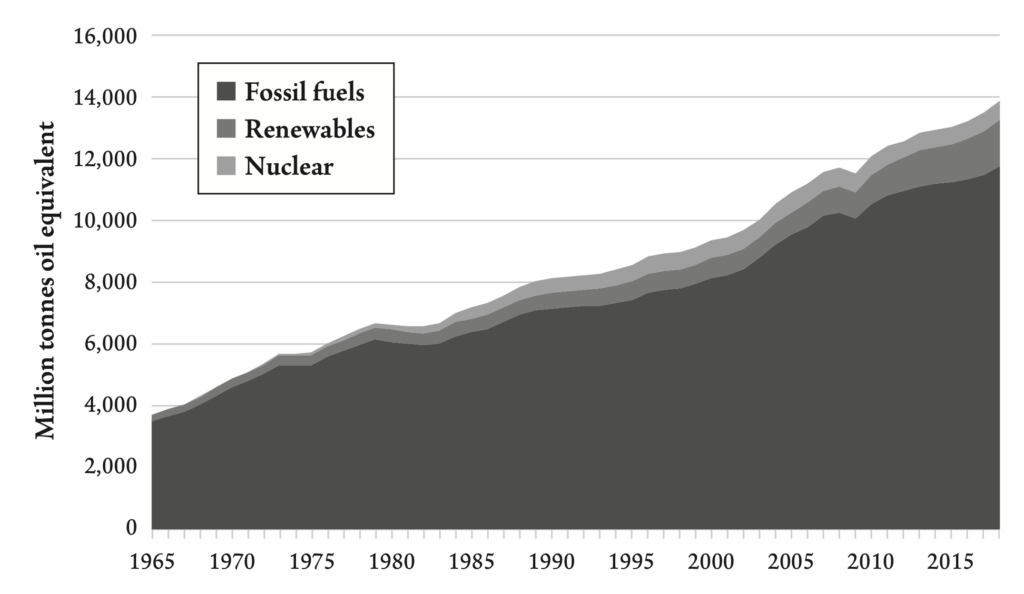
Figure 1.1. World Energy Consumption, 1965–2018. Source: BP Statistical Review of World Energy 2019
Figure 1.1 isn’t too encouraging in that respect. It shows climbing levels of fossil fuel consumption globally, from about 3,500 million tonnes of oil equivalent in 1965 to nearly 12,000 million tonnes in 2018.
The thin slivers at the top of the graph show consumption of lower-carbon, non-fossil fuel sources of energy, including nuclear power and renewables like hydro and solar electricity, wind power and biomass.
The proportionate contribution of these lower-carbon forms to the total energy mix has increased from 4% in 1965 to 13% in 2018. But these lower carbon forms of energy haven’t substituted for fossil fuels. They’ve merely added to a total energy consumption dominated by high-carbon fossil fuels, whose consumption has risen inexorably.
Even if we correct for population increase by considering per capita rather than absolute fossil fuel consumption, there’s still been an increase in fossil fuel consumption globally from about 1.05 tonnes of oil equivalent per person in 1965 to 1.55 in 2018 – another piece of evidence to suggest that the problems we face aren’t just population-related.1
The downward kink seen in Figure 1.1 around 2008 reflects the financial crisis of that year and its chilling effect on the global economy manifested in energy use. But, as you can see from later years, this turned out to be a short-run downturn in the longer upward trend. As this book is going to press, the global pandemic caused by the new SARS-CoV-2 virus seems certain to cause another and probably larger downward spike.
Collapsing demand for fossil fuels arising from the pandemic has caused an economic crisis in the oil and gas industry that’s prompted some analysts to question whether it can survive. But what’s clear from Figure 1.1 is that the modern global economy is utterly dependent on fossil fuels, whatever short-run price fluctuations the sector experiences in crisis conditions.
No fossil fuels, no capitalism in its modern form and no globalisation. So if the pandemic indeed puts paid to the oil industry and helps save the climate, if the downturn becomes permanent, we’ll need to devise a different kind of economic future for humanity. In fact, we need to devise a different kind of economic future for humanity anyway – however the long-term effects of the pandemic play out.
While proponents proclaim the virtues of low-carbon energy technologies, Figure 1.1 shows that these technologies aren’t even close to replacing fossil fuels or mitigating their impact right now.
The next energy revolution – if there’s to be one – is yet to begin.
This is especially problematic because meeting the 1.5°C global warming target of the 2015 Paris Agreement is already unlikely in view of committed emissions from existing fossil energy infrastructure,2 unless it’s prematurely decommissioned at high cost and without low-carbon replacements available at volume.
Currently available low-carbon replacements such as nuclear and renewables also have significant limitations as complete substitutes for our fossil-fuelled present. And even if they were rolled out now at faster rates than current implementation, their impact on GHG emissions wouldn’t itself be enough to prevent dangerous warming.3
To be clear, I’m not arguing against transitioning urgently from fossil fuels to low-carbon energy sources. Hopefully it’ll be possible to carry some of these sources through with us into a climate-stabilised future. But it seems wise to assume that people in the wealthy countries at least will have to get by in the future with lower per-capita energy consumption.4
The rising global consumption of energy, fossil fuel energy in particular, shown in Figure 1.1 is mysterious in that it isn’t driven independently by population, affluence or energy intensity but seems to follow its own internal dynamic – ‘energy begets energy’ in the words of two writers in the field – prompting humans to persist in furnishing as much of it as they can.5
The sobering implication of this is that the small but growing slivers of low-carbon energy sitting atop the thick wedge of fossil fuels in the figure aren’t the beginnings of a transition out of fossil fuels – they’re additions, not replacements, to humanity’s voracious energy consumption.
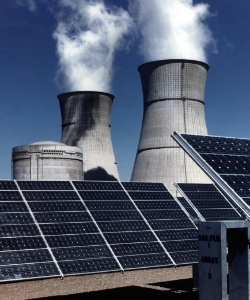 But the idea of energy begetting energy is odd. As we saw above, energy furnishes intermediate goods that do useful work for us. People surely don’t just toil to create intermediate energy stocks for fun.
But the idea of energy begetting energy is odd. As we saw above, energy furnishes intermediate goods that do useful work for us. People surely don’t just toil to create intermediate energy stocks for fun.
Instead, the present structure of the global economy involves a spiral of ever-growing capital investment, which is physically manifested in (fossil) energy use.
Further, as this capital is put to work in ever more complex and interrelated ways, the amount of energy used to produce the final outputs increases (there’s greater investment in the final and intermediate energy economy), even if the intensity of energy use to produce a given level of output diminishes.
This has two further sobering – though perhaps in some sense liberating – implications. First, it seems impossible to ‘degrow’ the global economy in its present form energetically without fundamentally changing it.
Otherwise, degrowth would equate simply with recession, joblessness and economic stagnation. Second, even if energy use could be made carbon neutral and effectively limitless, it’s likely that the compounding material trace of capital growth would then butt up against some other physical limit – soils, water, phosphates, pollution abatement and so on.6
But these sobering implications are potentially liberating because they suggest the present structuring of the global economy can’t continue, freeing us to work towards other kinds of economy. This is the lodestar of an emerging movement in economics working under the banner of ‘degrowth’ that aims to rethink the whole basis of economic action.7
It speaks to the mature human energetic ecosystem, in which energetic throughput is reduced relative to the fossil-fuelled bonanza of the 20th- century economy, while human well-being is retained or enhanced.
My position in this book is in keeping with the degrowth project, but I argue for a strong focus on agriculture as the key point of energetic transformation.
- BP Statistical Review of World Energy 2019, www.bp.com/en/global/corporate/energy-economics/statisticalreview-of-world-energy.html; WDI n.d.
- Tong et al. 2019.
- Berners-Lee and Clark 2013; Smil 2010; Smil 2017; Smil 2019.
- See, for example, Moriarty and Honnery 2019.
- Berners-Lee and Clark 2013, 81.
- Meadows et al. 2004; Turner 2008
- For example, Kallis 2018.
Recommended Reads
Sourcing a Solution: How Loving Labor Leads to a Brighter Future
Recent Articles
Chances are, you’ve seen cattails growing on the edge of your local lake or stream at least once or twice. Instead of just passing these plants, try foraging for and cooking them to create delicious seasonal dishes! The following excerpt is from The New Wildcrafted Cuisine by Pascal Baudar. It has been adapted for the…
Read MoreGarlic mustard: while known as “invasive,” this plant can be consumed in its entirety and has great nutritional value. Plus, the garlic-flavor is a perfect addition to any recipe that calls for mustard! The following are excerpts from Beyond the War on Invasive Species by Tao Orion and The Wild Wisdom of Weeds by Katrina…
Read MorePeregrine falcons, while known as predators, are essential to our environment. These stunning birds have a rich history, an interesting present, and an uncertain future. The following is an excerpt from Feather Trails by Sophie A. H. Osborn. It has been adapted for the web. Who Are Peregrine Falcons? Though relatively uncommon wherever it occurs,…
Read MoreWondering where to forage for greens this spring? Look no further than hedges, which serve as natural havens for wild greens and herbs! The following is an excerpt from Hedgelands by Christopher Hart. It has been adapted for the web. Food from Hedges: Salads and Greens Let’s start by looking at all the wild foods…
Read MoreInterested in becoming a mushroom farmer? Shiitake mushrooms are one of the easiest and most profitable places to start. The following is an excerpt from Farming the Woods by Steve Gabriel and Ken Mudge. It has been adapted for the web. (Photographs courtesy of Steve Gabriel and Ken Mudge unless otherwise noted.) The Stunning Shiitake…
Read More

